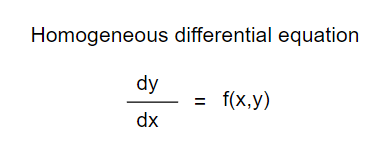Examples of Homogeneous Differential equations
- dy/dx = x(x - y)/y2
- dy/dx = (x + y)/(x - y)
- dy/dx = (x2 + y2)/xy
- dy/dx = (x3 + y3)/(xy2 + yx2)
Solving a Homogeneous Differential Equation
The general solution of a homogeneous differential equation is calculated by integrating the given differential equation.
A homogeneous differential equation: dy/dx = f(x, y) is solved by separating the variable and its derivative on either side, then integrating it with respect to the variable.
Note: The equation for the homogeneous differential equation does not include a constant term. A constant term exists in the linear differential equation. The solution for a linear differential equation is possible if the constant term is removed from the equation and is transformed into a homogeneous differential equation.
General steps to solve a homogeneous differential equation includes:
- We use the substitution y = v.x to solve a homogeneous differential equation of the type dy/dx = f(x, y). This replacement makes it simple to integrate and solve.
- The differentiation of y = vx, with respect to x, gives dy/dx = v + x.dv/dx.

3. By substituting the value of dy/dx in the expression dy/dx = f(x, y) = g(y/x) we get:
v + x.dv/dx = g(v) , where v = y/x.
4. Separating the variables v and x, we get:

5. Integrate LHS and RHS,

6. The general solution of the given homogeneous differential equation is

To obtain the general solution of the homogeneous differential equation, we replace the value of v = y/x. The inclusion of +C in the solution indicates that it is a general solution. By solving and substituting the value of +C, we can obtain the particular solution to the given homogeneous differential equation.
Let’s understand with an example,
Q: Solve the below-mentioned differential equation.
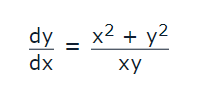
Solution:
- Try to make y/x terms.
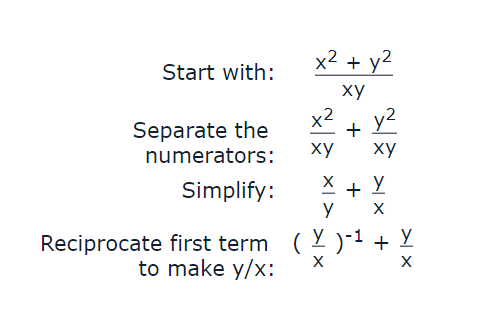
2. Now we have a function of y/x.
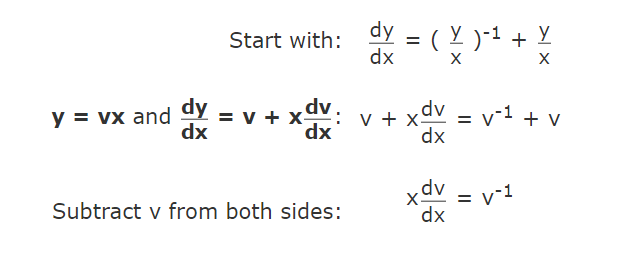
3. Now use Separation of Variables:
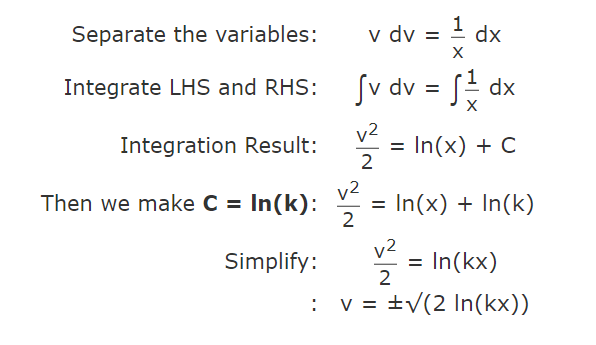
4. Substitute v = y/x

Hence Solved.
Also, Try Solving:
- dy / dx = y*( x - y ) / x2
- dy / dx = ( x - y ) / (x + y)
- dy / dx = ( 3x + 2y ) / 3y
- xCos(y/x)*dy / dx = y*Cos(y/x) + x
Frequently Asked Questions
1. What is a homogeneous differential equation?
A homogeneous differential equation contains a set of variables with differentiation and a function. In a homogeneous differential equation, the function f(x, y) is a homogeneous function such that f(λx, λy) = λnf(x, y) for any non-zero constant n.
2. Why is it called a homogeneous equation?
A linear differential equation Ly = f with some function f = 0 is called a homogeneous equation because if x is a solution of Lx = 0, then kx also solves this equation for some constant k.
3. How can we prove a differential equation to be homogenous?
To prove a differential equation to be homogenous, show that it is of the form f(λx, λy) = λnf(x, y) for any non zero constant λ.
Conclusion
In this article, we learned about Homogeneous differential equations. We learned that homogeneous differential equations are of the form f(λx, λy) = λnf(x, y) for any non zero constant λ.
We also learned about the steps required to solve a homogeneous differential equation.
Now you are all set to solve any level of the homogeneous differential equation.
You can use Coding Ninjas Studio to practice various DSA questions asked in the interviews. It will help you in mastering effective coding techniques, and you will also get interview experiences with people working in big companies.
